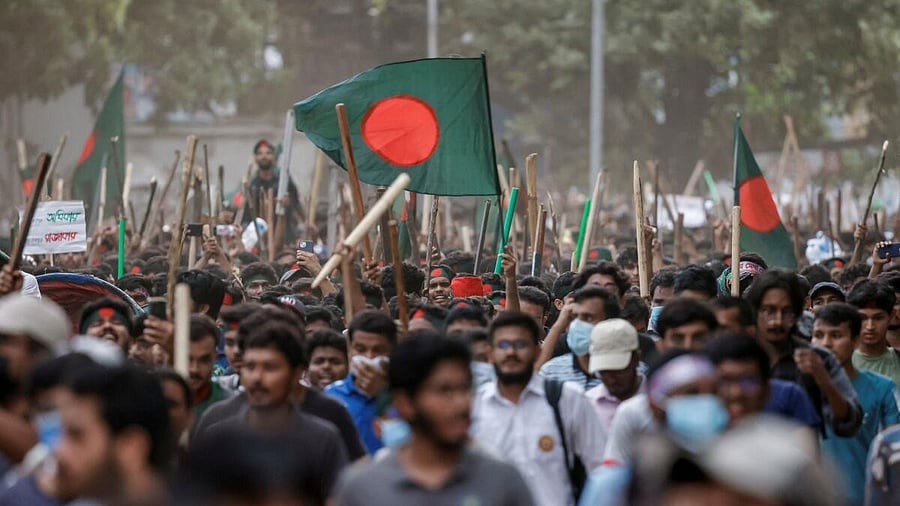
Crisis deepens in Bangladesh as Yunus faces mounting political pressure
Credit: Reuters Photo
Bangladesh is once again witnessing street protests by students, government employees, businessmen and even Islamist groups to press for one demand or the other. It is no exaggeration to say that ever since August, mobocracy has become the norm in Bangladesh. The breakdown of law and order remains a problem, with reports of looting, rapes and other anti-social activities pouring in. Clearly, Bangladesh continues to traverse difficult times.
Amidst all this, the recent threat by Chief Advisor Prof Yunus to step down can be seen through various lenses. It may have stemmed from deep exasperation and frustration in the face of the interim government’s inability to stabilise the nation. It may also have been some form of pressure tactic, while also testing the waters, given the various stakeholders and their diverse demands. Despite the varying interests, all the political entities rallied around to ensure Yunus stays on, and, for the time being, the political uncertainty has been averted. But the crisis is not over; it is a long way to the elections.
Differences also emerged from the controversy surrounding the humanitarian corridor that Bangladesh was going to facilitate to ensure cross-border supplies of food and emergency materials in the aftermath of the earthquake and the ongoing high-intensity conflict in the Rakhine region, as noted by UNDP. The lack of consultation with the major political parties, and especially the military, did not go down well. While no decision was taken, a difference seemed to have emerged between the interim government and the military, though not quite to suggest that the interim’s future was at stake. If the military had wanted to, it could have intervened earlier; there were enough opportunities. Army Chief Waker, on earlier occasions, has given stern warnings about the deteriorating law and order conditions, as well as mentioning the December elections. The differences, if any, would be with the student groups and their demands for deferring elections and their violent ways, as the army prefers not to be drawn into internal law and order control. The interim was set up with the backing of the army and continues to receive its support. The present military has little interest in becoming the political face of Bangladesh, marking a break from the pre-1990 phase. There is much at stake internationally, too. In fact, the army and the interim play the roles of good cop and bad cop vis-à-vis the students, youth and violent groups.
But the periodic street demonstrations and the tendency to air demands on the streets speak of a deeper malaise that needs addressing. While the interim government wanted to appear open and accommodating, it unleashed a flow of unhinged elements and outlandish expectations, which will pose a serious challenge for the government in the days ahead.
While Yunus has asked the National Consensus Commission to expedite reform initiatives to hold elections by June 2026, the exact date of general elections continues to be a vexed issue. While the military, the BNP and several other political alliances are in favour of December elections, the newly formed NCP, student leaders, Jamaat-i-Islami and a few smaller parties prefer to delay the date. By pushing the date beyond December, the parties will not gain any substantial electoral support but may open up some coalition options to ensure the BNP does not ride the anti-incumbency wave. For now, Awami League activities have been banned until the International Criminal Tribunals are held. Most AL leaders have fled Bangladesh, complicating the legal process, but also raising a question about the inclusive nature of the upcoming elections, while leaving a wide space for the opposition.
When the interim government took over, they had given themselves a mandate that was more than just holding elections. It expressed a desire to usher in changes that would strengthen democracy and ensure transparency and accountability. As it appears now, except for electoral ones, other reforms will be difficult to initiate. The interim took over a very politically fragile nation in dire economic and financial conditions. While there has been some stability in some sectors, according to the World Bank’s latest figures, Bangladesh has pushed 3 million people into poverty. Although this has been cited as a result of the COVID situation, the interim government, while having made some economic recovery, is not seen as providing the succour people expected from it.
Although fatigue appears amongst civil society, Yunus remains the most popular choice. The interim and student leaders need to agree on an election date sooner rather than later to ensure that Yunus carries forward Bangladesh to free, fair and inclusive elections.
Announcement of elections may perhaps ease the India–Bangladesh bilateral ties. The peeve is on both sides—Bangladesh’s growing closeness to Pakistan and China is seen as unfriendly, and India has reciprocated by restricting trade and trade routes. The next few weeks are critical. Will Yunus focus on immediate reforms and convince all stakeholders on the election date, or is Bangladesh going to be thrown into the throes of instability again?
(The writer is a professor at the Jindal School of International Affairs, O P Jindal Global University, Haryana)